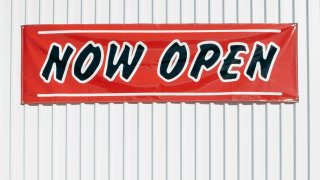
- Recession calls are being issued by major corporate CEOs and leading economists as Federal Reserve policy to fight inflation weakens business spending and growth, as well as consumer demand.
- Layoffs in the tech sector are leading a business retreat on aggressive hiring.
- But an economic downturn is not showing up in the data on new business formation and Main Street may still add millions of jobs if the Fed does not entirely choke off the economy.
- One of the pandemic's most unexpected economic trends was the boom in entrepreneurship, and while the rate of new business creation dipped recently, it remains strong.
If a recession is coming, someone forgot to tell the entrepreneurs.
As interest rates rise, inflation lingers and home equity that many business founders use to get started shrinks, small business formations are doing something unexpected – they're rising. Indeed, after a small lull earlier this year, new business formations have recovered to the elevated levels seen last fall, and their owners are hiring quickly, said John Haltiwanger, a University of Maryland economist whose new paper with Federal Reserve economist Ryan Decker documents the trend.
If the data persists, the resilience in small business formation points to a "new plateau" of activity that may add millions of jobs to the economy, Haltiwanger says. But the risks include the Fed itself choking off financial conditions so much that the small business boom is smothered.
Get New England news, weather forecasts and entertainment stories to your inbox. Sign up for NECN newsletters.
"Even with the volatility and the surge [earlier in the Covid pandemic] we're still 30 percent higher in 2022 than in 2019," Haltiwanger said. "People are being optimistic about the future and that's a good sign."
The Census Bureau reported almost 433,000 new business applications in October, up from 313,000 in December 2019, before the Covid pandemic began, and 413,000 as recently as June. In between, new business applications soared, topping out at 552,000 in July 2020, declining to 350,000 by Christmas, and rebounding to 500,000 by mid-2021, according to the Bureau.
Covid changed the economic equation
Money Report
Tamara Meyer began her new business in the fall of 2020. Danny Sweis opened his in the summer of 2022.
Meyer, a veteran corporate attorney in St. Petersburg, Fla., left a job as a legal vice president at a top-three managed care company to open Lakewood Strategy & Consulting, which helps corporations organize their in-house legal departments. One big issue: managing Covid-related disruptions and retaining legal talent in a disrupted job market.
Sweis, a chef whose Jordanian-born parents raised him in Oklahoma City, opened Ragadan, which he says blends the cuisine of the Middle East and American cattle country, in the Uptown neighborhood of Chicago this August.
Both tell familiar stories of years-old desire to strike out on their own, and how the Covid-induced restructuring of work and work-life balance, and economic conditions, presented at least as much opportunity as risk for each of them.
"Conventional wisdom says, this close to retirement, why shuffle the deck?" said Meyer. Covid-driven changes in work, across industries, meant opportunity for consultants like her. "Covid shuffled the perspective deck for everyone. It was a critical time to look at what made your team tick."
When Covid hit, Sweis was working for Chicago-based Cornerstone Restaurant Group, setting up a restaurant at Michael Jordan's Florida golf course. When that project ended, the immediate impact Sweis saw was that commercial rents were being offered at huge discounts as other businesses closed. He held off, figuring he would make little money if he opened in 2020. He took time to plan, and he and his wife had a baby. But as stocks surged in 2020 and most of 2021, his confidence in the economic recovery grew, he said.
"People are going to eat," Sweis said. "People like to complain about the economy, but most are pretty happy with where they personally are at."
Newly formed businesses have followed patterns familiar to those who have followed the Covid news, or seen their own lives disrupted – which is nearly everyone.
Where new businesses are being created
The largest number of new businesses opened have been in non-store retailing, which surged as shoppers avoided stores in 2020 and has held its market share since. The second-biggest category of new companies were in professional services like Meyer's, many started by people who decided to work from home or open an office near home.
And the largest number of new entrants came in suburban areas, as workers moved their own workplaces – and their spending on lunch and other services – to where they live rather than city centers where they once headed to offices. That may help explain why the restaurant industry, long a leading small-business employer in city centers, is still down 300,000 jobs since February 2020.
The biggest question has been whether these new businesses were growing enough to create jobs for anyone other than their founders. Haltiwanger says the answer is yes.
Using data from the Labor Department's Business Employment Dynamics series, Haltiwanger and Decker argue that new businesses are now creating as many as 1 million new jobs per quarter. If that lasts, that means 4 million per year, offset by 2.5 million lost as other small businesses close.
"We're actively looking at the [business formation data] for signs of an economic downturn," Haltiwanger said. "So far in the labor market, we're not seeing it. In other parts of the economy we are," he said, pointing to the housing market and durable goods sales.
The hiring by new businesses that Decker and Haltiwanger describe is a major force in an economy that had over 153 million total jobs in October, up 5.3 million from a year earlier. Recent surveying of small business owners across the nation has shown that while layoffs get the headlines, entrepreneurs can't find nearly enough workers for all the positions they want to fill.
"Its primary [macroeconomic] effect from where I'm standing is the labor market churn it's causing," Moody's Analytics economist Steve Colyar said. He argues that the new companies appear to be soaking up many workers who have switched industries, accounting for part of the wage pressures that larger employers are reporting. "Even if the net job gains are smaller, the size of that reallocation of workers is really interesting."
Sweis, whose neighborhood joint was just ranked by Chicago Magazine as one of the "10 Hottest Restaurants in Chicago right now,'' said he joined the trend of locating outside the city center to work closer to home.
After years working in downtown restaurants, he opened Ragadan in an economically-mixed area seven miles north of the Loop, he said. He has just added two part-time workers, he said, and hopes to have five to seven staffers within a year. Meyer said she's evaluating whether to add staff now, but says her process is slower because she needs highly specialized workers.
"The first year, you just work a lot," Sweis said.
There are still questions about how long the boom in new-business formation can last, and how big an impact it will have, Haltiwanger says. His paper with Decker lists the risks: Startup activity had slowed for years before Covid for reasons that aren't well understood, it's not yet known if the new companies will boost the economy's productivity – and, they said, the Fed's efforts to tighten monetary policy may lead to a recession.
"The young businesses started during the pandemic, and the continued elevated trend of business applications, may be at risk in the event of a broad economic slowdown," they said.
But Sweis argues that Ragadan's fate turns on a much simpler question.
"As long as I cook good food, none of that matters,'' he said.
"The fact that so many businesses have opened suggests that it will be persistent," Haltiwanger said. "It's not going to change over the next few months."






